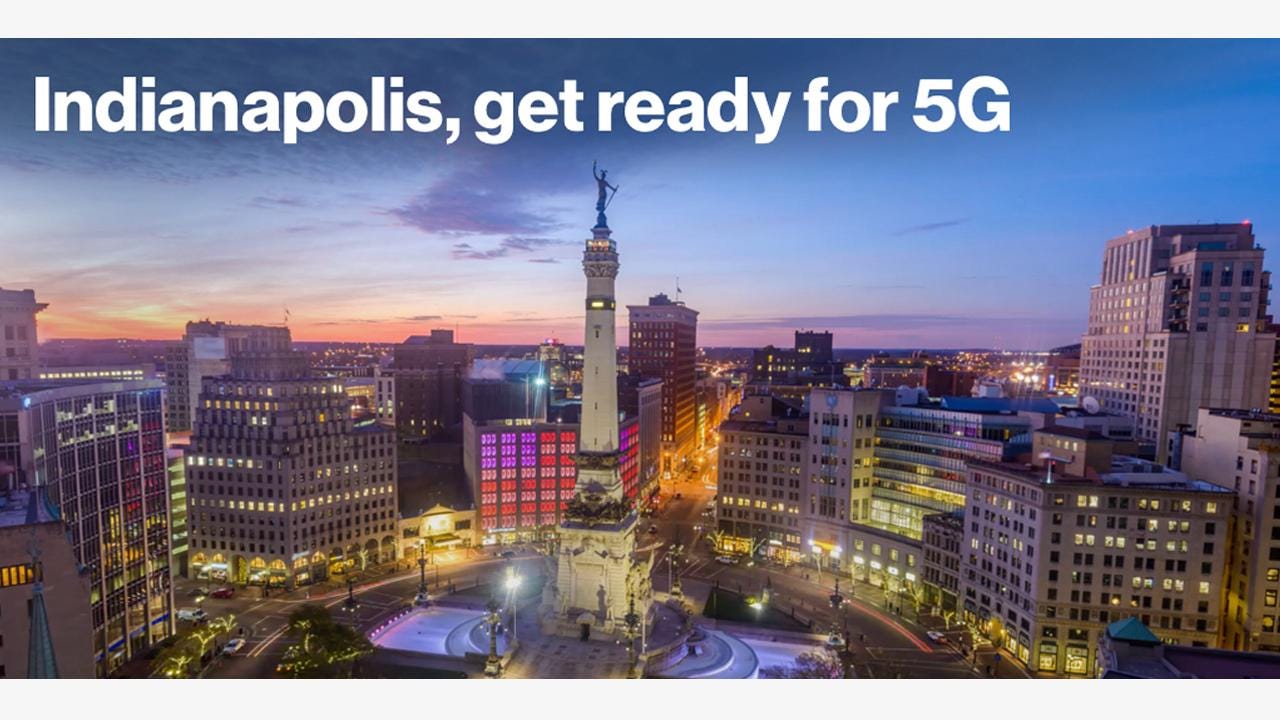Verizon bringing 5G to Indianapolis


Verizon has announced that it will be bringing its 5G network to Indianapolis by the end of 2018, with the city joining Sacramento, Los Angeles, and Houston in the carrier's roadmap.
"Verizon will be the first wireless technology provider to deploy 5G residential broadband service and 5G mobile service in the United States. Home internet service will begin in the four identified markets this year," Verizon said.
"As mobile devices become available in early 2019, Verizon plans to quickly move to be first in 5G mobile service."
According to Verizon, its choice of Indianapolis was an expansion of its partnership with Indiana state, as well as with Indianapolis Power & Light. Verizon executive vice president of Wireless Operations Tami Erwin called the city itself a "strong partner" in helping Verizon lay its 5G foundations.
Verizon had trialled 5G during the Indianapolis 500 motor race in partnership with Intel and Ericsson in May last year, using technologies such as beam forming and beam tracking to attain speeds in excess of 6Gbps.
"Indianapolis is one of our nation's leading tech and business hubs, making our community a natural location to launch innovative new technology," Indianapolis Mayor Joe Hogsett added.
"Verizon's commitment to collaboration through investments in our city infrastructure and upgrades to venues like Lucas Oil Stadium led naturally to this next step. We expect to continue to build Indianapolis' global reputation as a centre of innovation with the rollout of 5G."
Verizon on Tuesday also announced that its 5G services will include YouTube TV and Apple TV 4K when launching across Sacramento, LA, Houston, and Indianapolis.
Verizon CEO Lowell McAdam in May said Verizon will be making use of millimetre-wave (mmWave) spectrum for its 5G networks, having trialled the technology across 11 locations in 2017.
After last year signalling an acceleration of its 5G New Radio (NR) field trials with a goal of launching its next-generation mobile networks in 2019, Verizon in November said it would deploy between three and five 5G networks across the United States starting next year.
"Verizon estimates the market opportunity for initial 5G residential broadband services to be approximately 30 million households nationwide," the carrier said at the time, adding that the deployments would not have a material impact on its 2018 capital expenditure.
In June last year, Verizon had told ZDNet that one of the "key" parts of 5G is interoperability, with the carrier working with Ericsson, Cisco, Samsung, Intel, LG, Nokia, and Qualcomm to roll out its pre-commercial 5G trial network.
"Interoperability ... is very key," Verizon senior solutions architect Chris Painter told ZDNet.
"It's going to be a multi-vendor solution, so we need to have that interoperability."
Verizon's 11 pre-commercial 5G trial networks -- in Sacramento; Ann Arbor, Michigan; Atlanta, Georgia; Dallas and Houston, Texas; Miami, Florida; Seattle, Washington; Washington DC; Bernardsville, New Jersey; Brockton, Massachusetts; and Denver, Colorado -- were deployed throughout 2017.
Verizon has been additionally improving its LTE networks, in October adding Massive Multiple-Input Multiple-Output (Massive MIMO) technology across its wireless network in Irvine, California, increasing network capacity and speeds for customers in partnership with Ericsson.
Last month, Verizon and Ericsson further announced an expansion of their 4G LTE partnership, with the Swedish networking giant to deploy its 4G and 5G-ready radio system across multiple US markets.
The baseband and dual-band radios are software upgradeable to 5G once Verizon launches its new network, with the mobile sites also able to deliver narrowband Internet of Things (NB-IoT) and Cat-M IoT device connectivity.
"Working with Ericsson allows us to deploy the latest technologies on our 4G LTE-Advanced network. [It] will be an important component of our rapid transition to 5G," Verizon SVP of Technology, Strategy, and Planning Ed Chan said in July.
RELATED COVERAGE
- Verizon launching 5G in Los Angeles
- Verizon to deploy 5G in Houston (TechRepublic)
- Ericsson bringing advanced LTE to more Verizon cities
- Verizon tops Q2 earnings, subscriber targets
- How Verizon is using AR to up the ante on FiOS technician training
- AT&T, Verizon will launch 5G mobile hotspots before launching 5G smartphones (TechRepublic)
- Mobile device computing policy (Tech Pro Research)